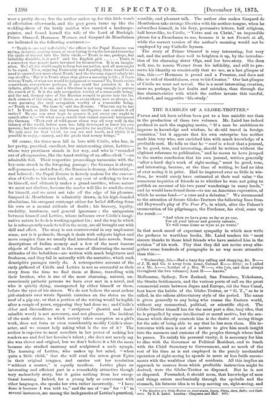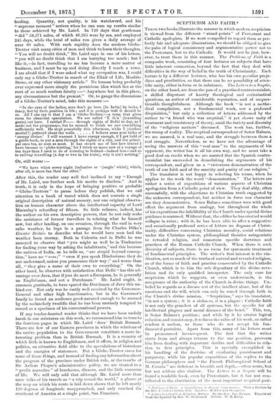THE RAMBLES OF A GLOBE-TROTTER.* PAPER and ink have seldom
been put to a less amiable use than in the production of these two volumes. Mr. Laird has indeed prefixed to each the engaging motto, " If a man be ambitious to improve in knowledge and wisdom, he should travel in foreign countries," but it appears that his own enterprise has neither made him very wise, nor enriched him with much knowledge of a profitable sort. He tells us that he " read in a book that a journal, to be good, true, and interesting, should be written without the slightest reference to publication," and he seems to have jumped to the unwise conclusion that his own journal, written generally "after a hard day's work of sight-seeing," must be good, true, and interesting, because, at the time of writing, he had no idea
of ever seeing it in print. Had he improved ever so little in wis- dom, he would surely have estimated at their real value "the numerous inquiries of friends as to whether he were not going to publish an account of his two years' wanderings in many lands," and he would have found them—to use an American expression, of which he seems fond—" a cuss and a delusion." We recommend to the attention of future Globe-Trotters the following lines from old Heywood's play of The Four P's, in which, after the Palmer's enumeration of his pilgrimages, the Pardoner, his rival, sums up the result:— "And when ye have gone as far as ye can,
For all your labour and gostely entente, Ye will come home as wyse as ye wente."
In that meek mood of expectant sympathy in which men write the prefaces to worthless books, Mr. Laird tenders his " most sincere thanks to those kind friends who have assisted him in the revision" of his work. Pity that they did not revise away alto gether some hundreds of paragraphs in no way more attractive than this:— "Wednesday, 5th.—Had a busy day calling and shopping, &c. B— of J. M. and Co. is away from home, Colonel E— ditto ; so I called on a Mr. A—, brother of a Mrs. W—, who [sic, and thus always throughout the two volumes] Aunt M— knows."
Melbourne, Sydney, New Zealand, San Francisco, Yokohama„ the Straits Settlements, and the various ports of call on the great commercial route between Japan and Europe, via the Suez Canal, best know the habits of the Globe-Trotter, or " G. T.," as he is called, in the odious abbrevMtory style of the period. The name is given generally to any being who roams the Eastern world, without any commerical, political, or scientific object. The Globe-Trotter himself has for the most part a dim, hazy idea, that he is propelled by some intellectual or moral motive, but the sen- timent which directly controls him is the desire of seeing things for the sake of being able to say that he has seen them. His in- tercourse with men is not of a nature to give him much insight into the manners and customs of the peoples through whose land he passes. To satisfy his personal vanity, it is necessary for him to dine with the Governor or Political Resident, and to lunch with the Chief Secretary to Government, and so much of the rest of his time as is not employed in the purely mechanical operation of sight-seeing he spends in more or less futile amuse- ments with the wealthier class of residents. All this implies an approach to sources from which profitable instruction might be derived, were the Globe-Trotter so disposed. But he is not so disposed. Persuaded, it should seem, that knowledge of men and things enters mechanically through the eyeballs and the stomach, his fatuous idea is to keep moving on, sight-seeing, and • The Rambles of a Globe-Trotter in Australasia, Japan, China, Java, India, aud Cash- mere. By E. K. Laird. London : Chapman and Hall. 1875. feeding. Quantity, not quality, is his watchword, and his 4' supreme moment" arrives when he can sum up results similar to those achieved by Mr. Laird. In 723 days that gentleman " did " 58,271 miles, of which 46,265 were by sea, and employed 245 days, while the total of miles run gives a daily average of over 80 miles. With such rapidity does the modern Globe- Trotter visit many cities of men and think to learn their thoughts. "You will no doubt think," Mr. Laird says in one of his letters, 4, you will no doubt think that I am hurrying too much ; but I like it,—in fact, travelling to me has become a mere matter of business, and I must be up and doing directly I reach a town. I am afraid that if I were asked what my occupation was, I could only say a Globe-Trotter in search of the Elixir of Life, Moabite Stone, or any other visionary article." No human being probably ever expressed more simply the pernicious idea which lies at the root of so much restless fatuity:—" Anywhere but in this place, any circumstances but the present." Or, to gauge the dimensions of a Globe-Trotter's mind, take this measure :— "In the eyes of the ladies, men don't go here [in India] by looks, I fancy, but by their position in life; and it is perhaps well it should be so. All I can say is that I am a 'Globe-Trotter,'—a term that gives room for abundant speculation. We are called ' T. G.'s ' (travelling gents) out here. I rattled P— through sights of Delhi to-day, as I made out the programme, but he seemed to think we saw everything sufficiently well. He slept peacefully this afternoon, while I (restless mortal !) pottered about the walls I believe some poet talks of energy divine.' I will warrant I have energy enough, if I get hold of a guide-book, to put a man through the sights of a city, and the princi- pal ones too, as soon as most. It has struck me of late how inured I have become to ' globe-trotting,' for I think no more now of a voyage of ten days than I used to do of crossing to Ireland—indeed less—and as to railway travelling (a day or two in the train), why it ain't nothing."
'Or, still worse :-
" We have whist every night (talkative or ' jungle ' whist), which, after all, is more fun than the other."
After this, the reader may well feel inclined to say " Enough of Mr. Laird, nor further seek his merits to disclose." And in truth, it is only in the hope of bringing positive or probable 4' Globe-Trotters " to pause before they publish, that we call attention to a book of travel which does not contain a single original description of natural scenery, nor one original observa- tion on human character above the intellectual capacity of Lord Macaulay's schoolboy of fifteen. So little reliance, indeed, has the author on his own descriptive powers, that he not only seeks the assistance of former travellers in relating what he himself saw, but after landing, on one occasion, through the surf in very calm weather, he lugs in a passage from Sir Charles Dilke's Greater Britain to describe what be would have seen had the weather been stormy. Both in Calcutta and in Delhi he was annoyed to observe that "you might as well be in Timbuctoo for finding your way by asking the inhabitants," and this because the natives of India, as he tells us, "are stupid beyond concep- tion," have no " noes;" " even if you speak Hindostanee they do not understand, unless you pronounce their way ;" and worse than all, ." they give a name of their own to everything." On the other hand, he observes with satisfaction that Delhi " has this ad- vantage over Java, that if you do meet a European, he is generally an Englishman, and not a Dutchman." Mr. Laird ought, in common gratitude, to have spared the Dutchmen of Java this un- kind cut. Not only was he vastly well received by the Governor- General and other high functionaries, but in the Governor's family he found an audience good-natured enough to be amused by the melancholy twaddle that he has been unwisely tempted to record as a specimen of his conversational powers.
If any tender-hearted reader thinks that we have been unduly harsh in our strictures on this work, we recommend him to turn to the fourteen pages in which Mr. Laird does' British Burmah. There are few of our Eastern provinces in which the relations of the native population to the Government constitute a more in- teresting problem than in British Burmah. It is a country of which little is known to Englishmen, and it offers, in religion and politics, an attractive field alike to the speculations of historians and the energies of statesmen. But a Globe-Trotter cares for none of these things, and instead of finding any information about the progress of the province under British rule, or the results of Sir Arthur Phayre's administrative policy, we are treated to a " prolix narrative " of luncheons, dinners, and the little concerns of life. We will only add that although Mr. Laird more than -once talks of his travels as " a trip round the world," a glance at the map on which his route is laid down shows that he left nearly 120 degrees of longitude unapproached, and only touched the continent of America at a single point, San Francisco.







































 Previous page
Previous page